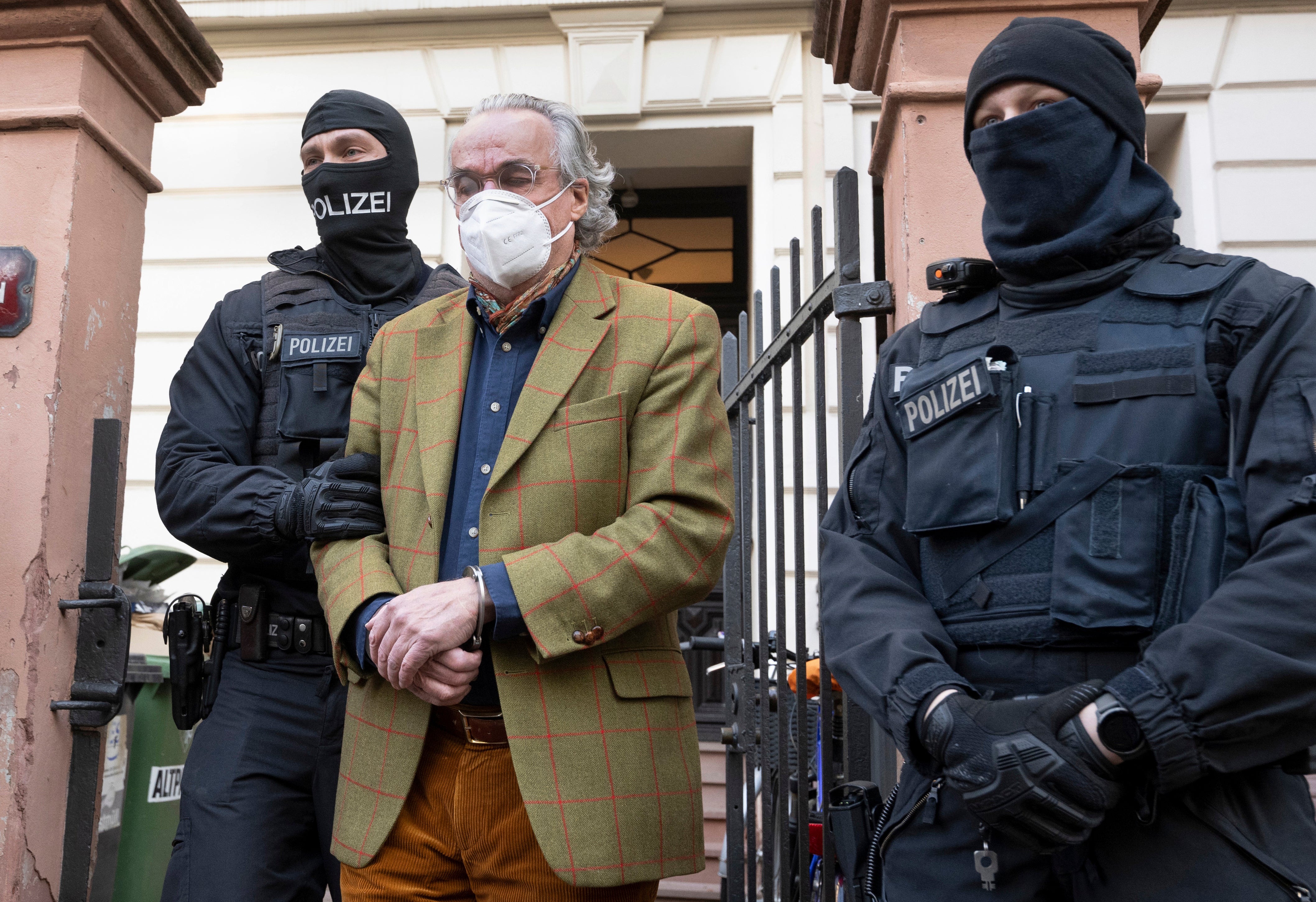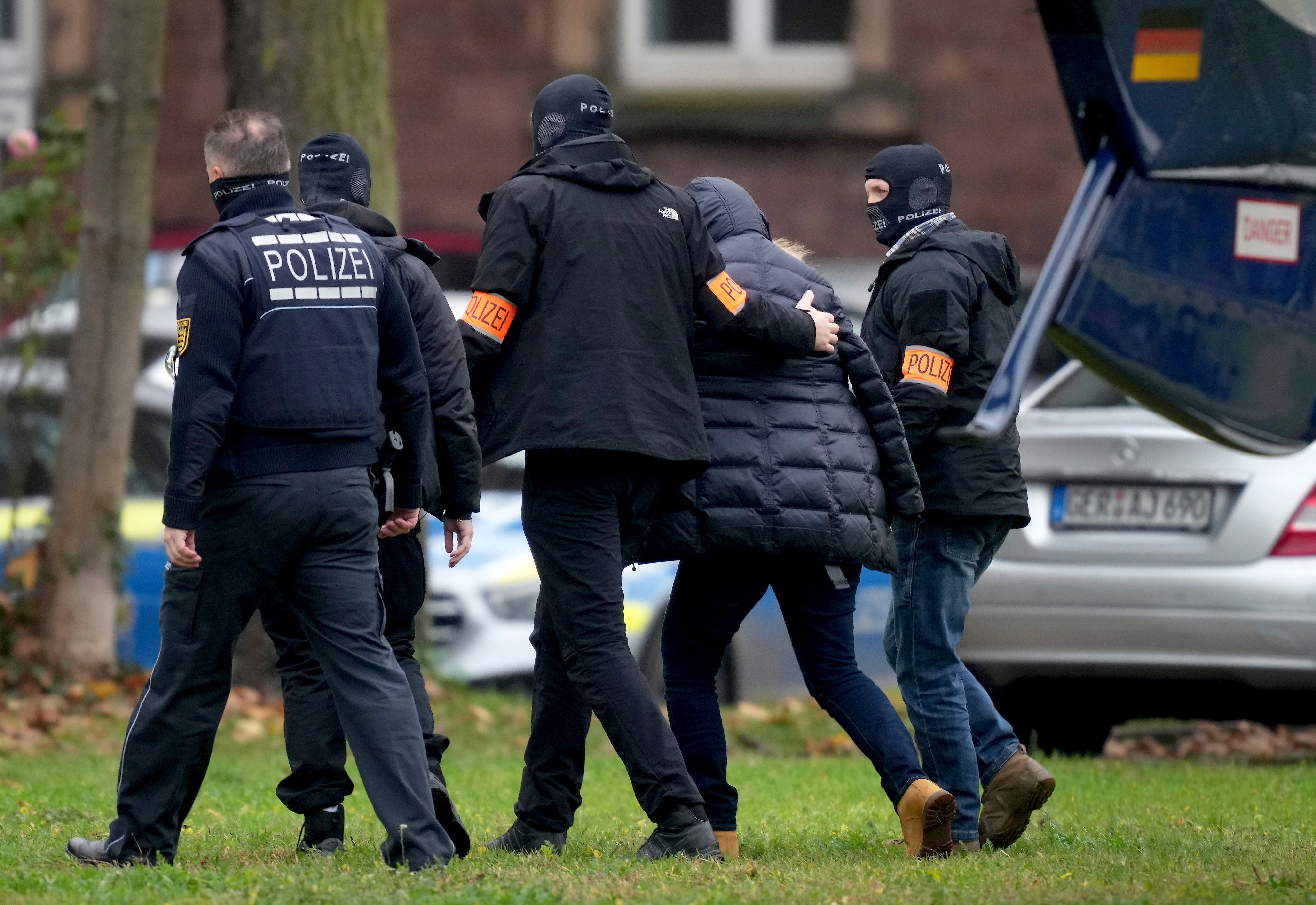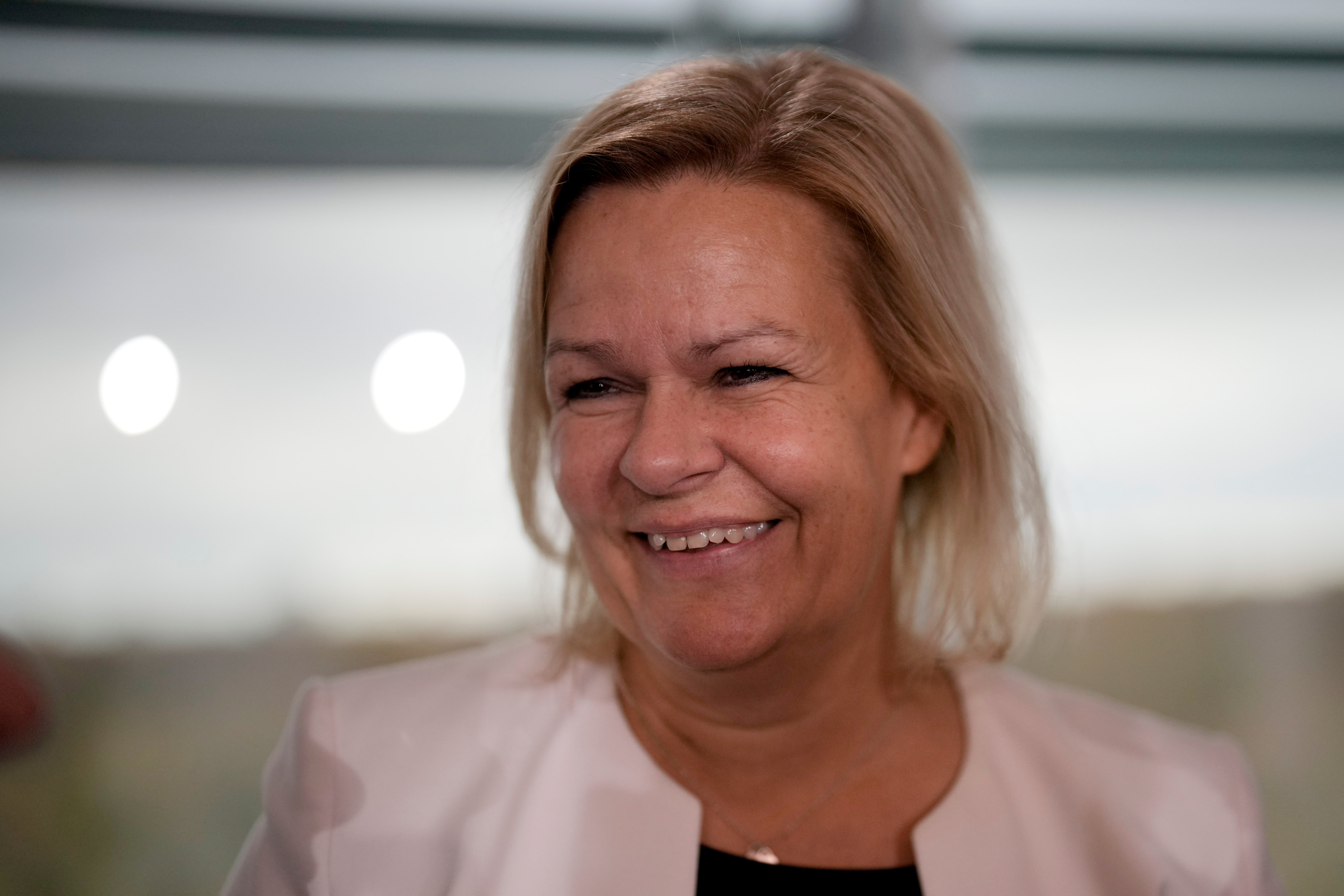‘Bonkers’, but terrifying: Why Germany’s comical coup plot should be taken very seriously
Borzou Daragahi takes a look inside the QAnon-fuelled plot to overthrow Germany’s government and revive the Reich


Your support helps us to tell the story
From reproductive rights to climate change to Big Tech, The Independent is on the ground when the story is developing. Whether it's investigating the financials of Elon Musk's pro-Trump PAC or producing our latest documentary, 'The A Word', which shines a light on the American women fighting for reproductive rights, we know how important it is to parse out the facts from the messaging.
At such a critical moment in US history, we need reporters on the ground. Your donation allows us to keep sending journalists to speak to both sides of the story.
The Independent is trusted by Americans across the entire political spectrum. And unlike many other quality news outlets, we choose not to lock Americans out of our reporting and analysis with paywalls. We believe quality journalism should be available to everyone, paid for by those who can afford it.
Your support makes all the difference.It was an outlandish and far-fetched scheme: take control of the world’s fourth largest economy, abolish its democracy, and install an obscure septuagenarian aristocrat as “emperor”.
But when German authorities monitoring the extremist “Reichsburger” movement earlier this year began piecing together the alleged plan to violently topple the government in Berlin, they considered it a grave threat, and placed it at the top of their security priorities.
On Wednesday, 3,000 German police and special forces units fanned out across 11 of Germany’s 16 states, arresting 25 people in 130 raids. Suspects were also arrested in Italy and Austria. Nearly 30 other suspects remain under scrutiny and more arrests will be forthcoming, German authorities have said.
German’s interior minister Nancy Faeser described those involved in the plot as “enemies” of the country’s democracy. “The investigations provide a glimpse into the abyss of a terrorist threat from the Reichsburger milieu," she said in a statement.
That a plot to seize control of the government and end Germany’s seven-decade democracy had advanced so far as to merit such draconian government action has shocked Europe. But experts say it underscores just how serious a threat the far right has become, even as the menace of Isis and Islamic militancy has waned.
“If those raids had taken place against jihadis, we would be talking about this for the next two weeks,” says Colin P Clarke, director of research at the Soufan Group, a Washington-based security consultancy. “To arrest 25 people, that’s a pretty big network.”
Germany has frequently described the far right as a top threat to its security following repeated and sometimes deadly attacks by fringe groups against politicians and immigrants. “The greatest extremist threat to our democracy is right-wing extremism,” said an Interior Ministry report published this year. “This violence did not come out of nowhere, it has a breeding ground: a misanthropic climate that incites violent extremists and allows them to take action.”
Reichsburger, which mean “citizens of the empire”, is a movement fuelled by the recent rise of right-wing populism, the continued impact of the Covid-19 pandemic and the spread of QAnon-inspired conspiracy theories from the United States. The particular strain of far-right politics has spread across the Western world and even further abroad.
Interviews with security experts and an examination of the Reichsburger plot show the many dangers of the far right, even with all of its delusions.
“The Reichsburger movement has been gathering steam for some time and the pandemic seems to have supercharged that,” says Raffaelo Pantucci, an expert on far-right movements and extremism at the S. Rajaratnam School of International Studies In Singapore. “But this still sounds pretty bonkers – the idea you’re going to take over Germany and reinstate a monarchy.”

A bespectacled, silver-haired 71-year-old was photographed in handcuffs and a plaid jacket on Wednesday as he was escorted away by masked police from his home in an upscale district of Frankfurt. He is Prince Heinrich Reuss XIII and, according to authorities, the coup plotters hoped to install this little-known descendant of the country’s last emperor to the throne of a monarchy modelled on Germany’s 1871 Reich.
Reuss has for years been railing against the German government, spouting antisemitic conspiracy theories as an outspoken figurehead of the Reichsburger movement. He appears in videos online espousing his role as heir to a “1,000-year dynasty” that was unjustly usurped. He claims Freemasons schemed to trigger the First World War, and that Nazis were backed by American financiers hoping to create Israel.
Any plot headed by such a garish figure may sound like pure fantasy. But his movement consists of a loosely organised network of 21,000 or so members. All are vehemently opposed to the current German government, with some holding avowedly neo-Nazi views, including denial of the Holocaust. According to prosecution officials, those arrested this week are part of a subset within the Reichsburger world established late last year “with the goal of overcoming the existing state order in Germany and replacing it with its own form of state, which has already been worked out in outline”.
Reuss’s alleged co-conspirators include a former far-right member of parliament, Birgit Malsack-Winkemann, now serving as a judge, as well as numerous members of the security forces.
Like their QAnon counterparts in the US, they are convinced that Germany is under the thumb of secretive members of a “deep state” but that an alliance of Russian, American and other security personnel were preparing to swoop in and help them restore a righteous order.
To prepare for or hasten that day, the group was allegedly stockpiling weapons, some of them procured illegally. A “military arm” of the movement was to wipe out federal, state and local government authorities. Investigators say the plotters had begun training new recruits in shooting, fully embracing the idea that there would be deaths on their path to a renewed German Reich.
Some in the media have mocked the plot as overblown. Among the conspirators are an opera singer and a gourmet chef. But others arrested included a former Bundeswehr colonel, Maximilian E, who had led a tank battalion during Nato’s Kosovo intervention, Rüdiger von P, a former lieutenant colonel who commanded a parachute battalion in the 1990s, and an active-duty soldier from Germany’s elite KSK named Andreas K.
Among others netted were a well-known neo-Nazi as well as a police officer who was fired in 2020 for comparing Covid rules to Nazism.
“The members of the association are aware that this project can only be realised through the use of military means and violence against state representatives,” says the prosecutor’s brief.
The plotters had also already sketched out their own future administration. While Reuss was to be future leader of the Reich, Malsack-Winkemann, 58, would head the judiciary. As a former member of parliament, she continued to have access to sensitive areas within the building, making her a key figure in the alleged conspiracy.
One member of the group arrested was a Russian national who has been described as Prince Reuss’s girlfriend, Vitalia B. She and the prince had allegedly reached out to representatives of the Kremlin and sought to win them over to their cause. But German officials say there is no evidence they accepted, or that the group was being supported by the Kremlin, which has numerous ties to far-right European groups. Analysts suspect Russians might have considered the plot too ridiculous, even as they have regularly supported right-wing biker gangs and fringe figures touting phoney Covid cures.
“The Russians tend to surface in all of these stories,” says Clarke. “They very well could have been approached, and they might have thought it was a trap.”
German press accounts cited officials as saying authorities had infiltrated the group’s electronic chats, which had raised alarm bells, and prompted the security forces to act.
“There was the prince, and that’s the Scooby Doo villain, but there were some serious players involved,” says Clarke. “The most significant thing was that a lot of these individuals seemed to have military training and experience, including battalion commanders and special forces operatives who had access to illegal weaponry.”

The Reichsburger movement has been around for some years. Adherents have made up their own passports in their attempts to reject the authority of the Berlin government. Followers refuse to recognise the Federal Republic of Germany, its courts, parliaments or law, and insist the Reich continues to exist to this day. They resist paying taxes, social security contributions or fines. They were largely mocked and ignored by many Germans, and even downplayed by authorities. They were a motley assortment of neo-Nazis, members of the far-right Alternative for Germany (AfD) party members, and various conspiracy theorists.
“It might sound like a freakshow if you’re looking at these people,” says Robert Andreasch, a Munich-based journalist and researcher specialising in Germany’s far right.
But the movement got a lift in recent years. It managed to draw new recruits and energy during the waves of lockdowns, especially by members delving into extremist websites touting anti-vaccination theories. Others were influenced by American-inspired QAnon-like conspiracy theories about shadowy figures within controlling our lives.
Similar theories drove those who attacked the US Capitol building on 6 January 2021 in an attempt to reinstall Donald Trump as president after his loss to Joe Biden. And, chillingly, the alleged Reichsburger plot resembled those of the Capitol Hill rioters and militants – stockpile weapons, storm parliament, take control of legislators, and declare Heinrich ruler. Even if the plan failed, it could have caused a lot of damage, and perhaps cost lives.
“It can be dangerous from a security angle if you have highly radicalised people whose worldviews have completely detached from reality,” says Jakob Guhl, a German researcher who tracks far-right groups for the Institute for Strategic Dialogue, a London think tank. “There’s a risk that these people will start taking matters into their own hands and form armed units and take action.”
There were reasons to believe the would-be putschists were inclined to action. German authorities had been warning for months that the far right were using protests against the Covid-19 restrictions to draw recruits, alleging that militants were effectively infiltrating protests and movements opposed to pandemic restrictions.
“They think they are bigger than they are,” says Andreasch. “They’re very narcissistic. For sure they won’t overthrow the government but 100 people with weapons are a terrific danger.”
Authorities launched a series of raids against the group in March 2020, seizing weapons and Nazi literature deemed illegal under German laws.
In August 2020, in a foreshadowing of both the alleged Reichsburger plot to seize the nation’s legislature, mostly unarmed anti-Covid protesters holding the pre-1918 flag of the German Empire attempted to seize the parliament building in Berlin, breaking through police barricades.
The next year, police battled anti-Covid protesters again in front of parliament, with 150 arrested after demonstrators threw bottles at police.
In April, German authorities foiled a scheme by Reichburgers to kidnap and kill German health minister Karl Lauterbach; police in Germany say it was that plot that opened the door to the current probe.
Over the past year, Covid-19 masks and health pass requirements have largely fallen by the wayside in much of Europe, and QAnon has largely been discredited. But the months of turmoil and confusion have had a lasting impact. A core of people radicalised during those years remain in place, and are perhaps the most dangerous militants of all.
“There are far fewer people online consuming this stuff,” says Clarke. “But the people who are left are the most hardcore of the hardcore. The people who are still in it are all about it. You’re looking at the most hardened members of these various conspiracies – it’s not the people who dabbled in it. It’s the people who really marinate in it and are fully compelled to act.”
Similar movements are percolating around Europe, often entangling uniformed members of the security forces. In the Netherlands, the extreme right has glommed onto a farmers’ revolt as well as deep opposition to Covid restrictions. France has disrupted several such terror plots. Belgian soldier Jürgen Conings, a far-right militant who had vowed to kill politicians and health experts involved in Covid measures, was found dead last year of an apparently self-inflicted wound after leading authorities on a weeks-long manhunt.

The fringe groups and players are sharing ideas across borders, making them transnational as well as global. “Far-right movements around the world are increasingly communicating with each other,” says Eviane Leidig, an associate fellow of the International Centre for Counter-Terrorism in the Netherlands. “They share ideological discourses, as well as common tactics for mobilisation. There is a merging of anti-government and right-wing extremism.”
Such movements may sound kooky and even less-than-dangerous, and it would be easy to dismiss them as nuisances. But never underestimate the aims of a zealous and well-organised few. If their means and aims sound unrealistic and fanciful, just imagine how a scheme to seize much of Iraq and Syria and establish a medieval caliphate would have sounded around 2011, or how a plot to establish the world’s first communist dictatorship in tsarist Russia might have come off in 1914.
There is also a threat that fringe ideas about immigration and democracy are bleeding into the mainstream, aided by conventional media outlets and politicians such as France’s Eric Zemmour and the Netherlands’ Thierry Baudet. Just witness the prominence of the “great replacement” theory which posits that “globalists” are seeking to displace white Europeans with immigrants, or the more recent “great reset”, a rapidly growing conspiracy theory that claims the Covid pandemic was a plot by murky elites to impose bio-social controls on populations.
“These types of fringe movements have started to leverage themselves into mainstream movements,” says Leidig. “The greatest danger is that their beliefs and goals are being amplified and given visibility to mass audiences through mainstream figures like politicians and media commentators.”



Join our commenting forum
Join thought-provoking conversations, follow other Independent readers and see their replies
Comments